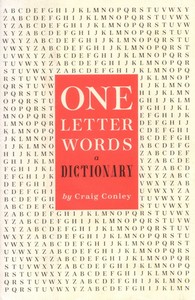Is our
One-Letter Words: A Dictionary a sham? Australian secondhand book dealers Huc & Gabet discovered our tome amid Latin and Yiddish dictionaries (we approve), then asked a bookseller and a scientist (who had never seen our book) if such a dictionary must be a sham. Here's the
full report.
We sure do hope their puzzling definition of "dictionary" doesn't reach the ears of Ammon Shea, author of
Reading the OED: One Man, One Year, 21,730 Pages, since he read the Oxford English Dictionary cover to cover, for
enjoyment! (Who'd've thunk it?)
But seriously, we're glad all the recent natural disasters in Australia haven't distracted from the really important issues.
---
Mike responds:
As I understand the argument in this review, a key premise is that a "proper" dictionary must contain the definitions for any word entry on a single page (or perhaps some number of pages fewer than eight -- as Huc & Gabet phrased their objection to One-Letter Words: A Dictionary, "to get a meaning you need to read 8 pages of text"). If one searches for the word "set" on dictionary.com, one finds that the word has over 100 definitions. So by extension, H&G would be forced to admit that either (1) dictionary.com is not a dictionary, or (2) the word "set" is not a word. I'm frankly dumbfounded by the logic in this review.
June writes:
I am feeling completely shammed by the illustrated dictionary on my shelf. Where could something like this lead? On some pages there are only three illustrations, and no definitions at all, merely labels. I doubt its very existence.
Allan elucidates:
dic·tion·ar·y [dik-shuh-ner-ee] –noun, plural -ar·ies.
1. a book containing a selection of the words of a language, usually arranged alphabetically, giving information about their meanings, pronunciations, etymologies, inflected forms, etc., expressed in either the same or another language; lexicon; glossary: a dictionary of English; a Japanese-English dictionary, one letter words.
Hmmmm!
June adds:
"Out of a human population on earth of four and a half billion, perhaps twenty people can write a book in a year. Some people lift cars, too. Some people enter week-long sled-dog races, go over Niagara Falls in a barrel, fly planes through the Arc de Triomphe. Some people feel no pain in childbirth. Some people eat cars. There is no call to take human extremes as norms." —Annie Dillard (The Writing Life)
And some people observe and comment upon what others do. Each of us does what he can do.
Jeff writes:
I have unraveled the mystery.
I believe this "Robin" is, in fact, a precocious two-month-old who recently became aware of his fingers, and is now happily engaged in "reviewing" every book on his father's shelf.
Strangely, he is able to construct quasi-coherent sentences, but hasn't yet acquired the ability to read.
His mother is a "scientist."

Prof. Oddfellow asks a potentially trick question: can you find the
sham?
He holds a copy of his dictionary of one-letter words and Robert E. Neale's
This is Not a Book.




